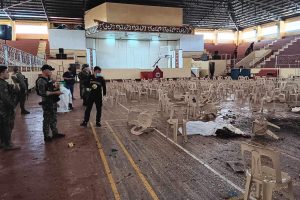 Four Christians were killed and 54 others were injured in a bomb attack on an Advent Sunday service at a university in the Philippines on 3 December. Most of those killed or injured were students attending a Catholic Mass that was being held in the gym at Mindanao State University in Marawi, a city in the south of the country. A group affiliated to Islamic State claimed responsibility for the attack.
Four Christians were killed and 54 others were injured in a bomb attack on an Advent Sunday service at a university in the Philippines on 3 December. Most of those killed or injured were students attending a Catholic Mass that was being held in the gym at Mindanao State University in Marawi, a city in the south of the country. A group affiliated to Islamic State claimed responsibility for the attack.
Armed Forces Chief Romeo Brawner, who attended a security briefing with troops and police in Marawi following the attack, said he suspected the bombing could be in retaliation for recent military operations against local pro-Islamic State extremist groups in the southern region of Mindanao. Several militants were killed in these operations and firearms and explosive devices were recovered. “It is possible that what happened this morning was a retaliatory attack,” he told a press conference.
Following the security meeting William Gonzales, Western Mindanao Command chief, told reporters: “As we speak, there’s an ongoing massive operation to hunt these terrorist groups or suspected perpetrators of the bombing.”
Regional police chief Allan Nobleza later told Philippine media company GMA News that police had identified persons of interest but that “the investigation is still ongoing. In order not to pre-empt the investigation, we will not divulge the names.” He confirmed that one of the suspects was linked to a local militant group.
Filipino President Ferdinand Marcos Jr condemned the deadly bombing, saying: “I condemn in the strongest possible terms the senseless and most heinous acts perpetrated by foreign terrorists. Extremists who wield violence against the innocent will always be regarded as enemies to our society.”
Bishop Pablo Virgilio David, president of the Catholic Bishops’ Conference of the Philippines, said in a statement, “Such violence should not only be denounced; it should also be renounced as a way of seeking redress by every peace-loving Filipino.”
Open Doors quoted a local Christian leader, a convert from Islam who cannot be named for security, who said: “We are not afraid, but we are being more cautious.”
The Philippines is over 80 percent Christian, predominantly Roman Catholic, but the southern part of the Mindanao Island group has a significant Muslim population and is home to violent extremist groups that have been fighting for an independent Islamic state for over forty years. Christian converts from Islam in Mindanao face pressure from family and community.
Marawi city was left in ruins in 2017 after a five-month military campaign to end a siege by IS-affiliated militants, with Islamist militants and Philippine forces killing more than a thousand people and displacing over 400,000 others. The militants had seized Marawi in an attempt to establish an Islamic State governorate.
(Asia News, Catholic Bishops’ Conference of the Philippines, International Christian Concern, Open Doors, Reuters)
Photo: Catholic Bishops’ Conference of the Philippines/Lanao Del Sur Provincial Government
